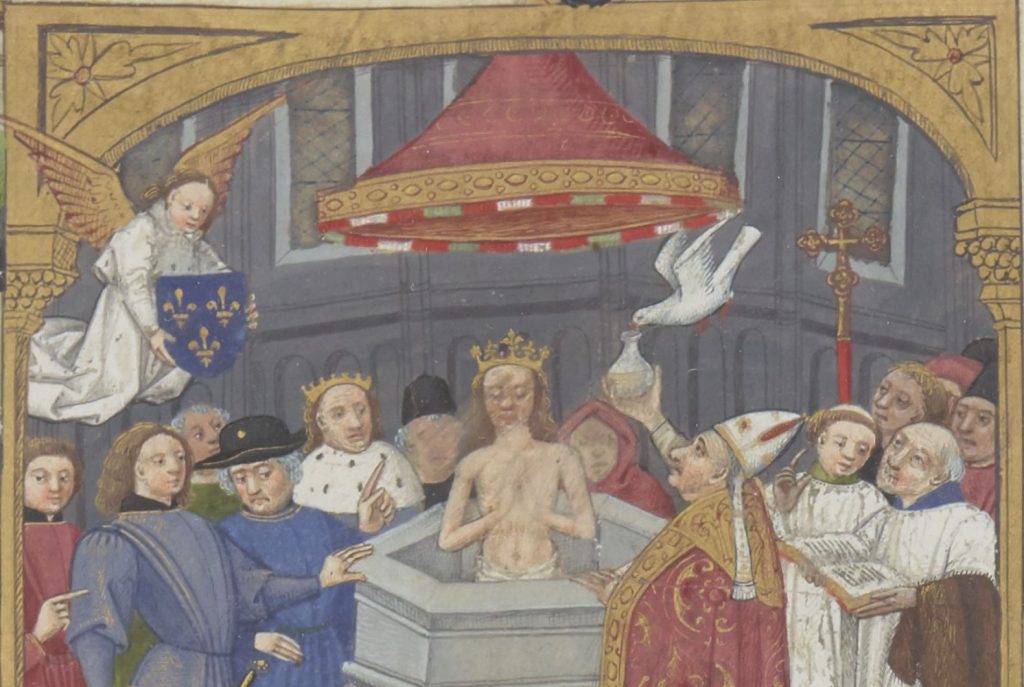Breaking the Ampoule January 23, 2017
Author: Beach Combing | in : Medieval, Modern , trackbackA WIBT moment from eighteenth-century France: the collision of the hoary old with the bright-eyed, metallic and ghastly new. It involves a cathedral, a hammer and the crystal fragments of a Roman perfume bottle, the Sainte Ampoule, one of the longest continuously used objects in world history. This tiny flacon had been made in the late Roman Empire. It was certainly employed, in 1131, in the coronation of Louis VII: Louis was anointed by the pope of the day no less with oil from the ampoule. The bottle, it was claimed, though, had first been used at the baptism of Clovis in the fifth century when it was brought from heaven by a dove no less: and it had sealed the crown of every king since, or at least so the myth makers of French royalty claimed. Just to put the ampoule in perspective the English equivalent dates to no later than 1399.
Pathetic.
This symbol of the Merovingian roots of the French monarchy was kept in a place of honour at the Abbey of St Remi in Rheims. 10 May 1774, it was used to anoint Louis XVI when he was made king of France. And when the young Louis felt the oil on his forehead he must have thought, with some satisfaction, that one day his son and his son’s son would also be made kings with the liquid from out of this same antique bottle: there is some debate as to what the liquid was – it is not impossible that it was fourth or fifth century perfume. However, as sometimes happened in this turbulent modern age, events intervened. In 1789 the revolution began. In January 1793 Louis’ head was removed by the blade of the guillotine. And the bottle? 7 October of 1793 (16 vendémiaire of the second year), Philippe Rühl, the oldest deputy in the national assembly, ‘a cold and severe Alsatian’, who would later stab himself to death with a knife, decided to end this affront to egalité. Rühl took the bottle to the place where a statue of Louis XV had once stood. Poor old Louis XV had long since been washed away by ‘the flood’, but Rühl, in front of a large crowd, placed the ampoule on Louis’ pedestal and hammered it into pieces, as those about him sang ‘patriotic songs’. There is no description of a heavenly smell, though this may be because much of the oil had been siphoned off by a royalist the day before: or at least this is what was claimed when the French needed the ampoule again… The smashed fragments were then sent by Rühl to the National Assembly that rose in applause when the dubious gift arrived. Today the fragments of the ampoule are one of France’s national treasures. They could usefully be made into part of the regalia of the new Europe.
The only thing worse than Saturn eating his children, is Saturn’s children eating Saturn.
Other WIBT moments: drbeachcombing AT yahoo DOT com
29 Jan 2017: KMH, Referring to “…there is some debate as to what the liquid was – it is not impossible that it was fourth or fifth century perfume,” the tradition of anointing priests and kings with oil goes all the way back to biblical times. The formula for the oil is given in Exodus 30:22-33, which was essentially olive oil with some spices. We can see a pale reflection of the tradition today in the Catholic church in the rituals for baptism, confirmation, and the sick or infirm. The oil symbolized the Holy Spirit, or Spirit of God, being imparted to a higher degree than for ordinary people. With the smashing of the ampoule, all hope for true kingship was over for France, as history has verified. However, there are many prophecies of a future figure called the “Great Monarch” arising in France (a descendant of Charlemagne) who militarily defeats all her enemies. I doubt he will be anointed in the traditional way since we have left the era of kings and queens behind and only a few figureheads now remain.
29 Jan 2017, Bruce T: I recall a tale about that one years ago. When the oil ran low, the Bishop would consecrate another jar of oil and they would add that. As it was added to the possible remnants of the sainted oil, it worked along the lines of medieval religious homeopathy. The spiritual “essence” of the ampule was still there in the presumed tiny bit of original oil left in the thing when you anointed the next King. Those French clerics were right up there with the boys in Jerusalem and the miracle of the Holy Fire. Personally I’d bring back indulgences, there was a money maker. No one with the last name of Luther need apply.



